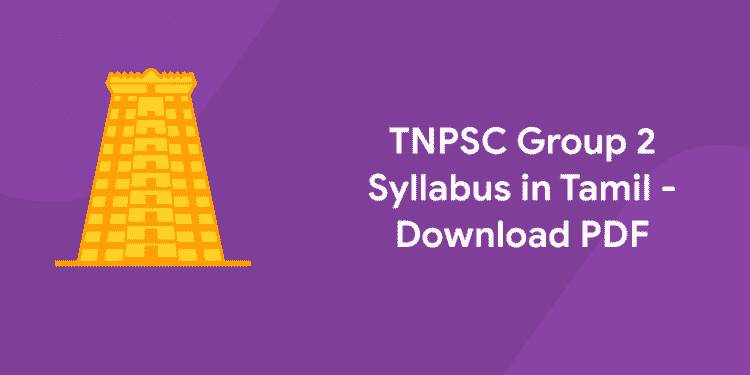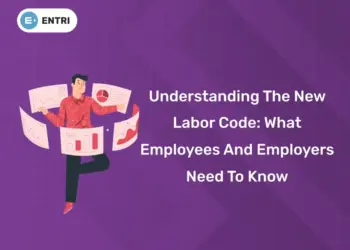Table of Contents
The TNPSC Group 2 Exam is one of the most sought-after recruitment tests conducted by the Tamil Nadu Public Service Commission (TNPSC). It offers candidates a chance to secure prestigious positions in various Tamil Nadu Government departments under Group II (Interview) and Group IIA (Non-Interview) services. To crack this exam, candidates must clearly understand the TNPSC Group 2 syllabus and exam pattern. Knowing the subjects, marks distribution, and paper structure helps you plan better and focus on important topics. In this blog, you can find the complete TNPSC Group 2 syllabus and exam pattern for both the Preliminary and Main examinations in a detailed format.
Crack TNPSC Exam with Expert Mentors! Get Free Demo Classes Here!
TNPSC Group 2 Exam Pattern 2025
The TNPSC Group-2 services include two stages of written examination followed by a personal interview to select the eligible candidates. The TNPSC Prelims exam will have 200 Multiple Choice Questions/ Objective types. The question papers will be available in both English and Tamil medium. The questions are from General Studies (Degree Standard) and Aptitude and Mental Ability Test. The total duration of the Prelims Exam will be 3 hours. The minimum qualifying marks for the TNPSC Group 2 Prelims Exam will be 90 out of 300. Given below, we are sharing the details of the TNPSC Group 2 2025 Exam Pattern.
Preliminary Examination
As a part of the TNPSC group 2 selection process 2025, the candidates will first have to pass the preliminary examination. The preliminary examination will have 200 questions for 300 marks. Given below is the table indicating the details regarding the TNPSC Group 2 preliminary examination pattern. You must prepare yourself accordingly.
| Topic/ Subject | No of Questions | Maximum Marks | Minimum Qualifying Marks |
| General Studies (Graduation Level) | 175 | 262.5 |
90
|
| Aptitude and Mental Ability Test (Matriculation Level.) | 25 | 37.5 | |
| Total | 200 | 300 |
Main Examination
After successfully passing the preliminary examination the candidates will have to give the main examination. The main examination will be of a total of 300 marks and the candidates will have to successfully get a qualifying number of marks in order to go to the third stage of the TNPSC Group 2 selection process 2025. Given below is the table indicating the details regarding the main examination pattern for TNPSC Group 2 recruitment opportunity 2025.
| SL.No | Paper | Topic | Number of Questions |
Marks for Each Question | Total Marks |
| 1 | Part A | Tamil to English Translation | 2 | 25 | 50 |
| 2 | English to Tamil Translation | 2 | 25 | 50 | |
| தாள்-1 இல் குறைந்தபட்ச மதிப்பெண் (25) பெறாத தேர்வர்களின் விடைத்தாள்-2 மதிப்பீடு செய்யபடாது. | |||||
| 1 | PART B | Precis Writing | 2 | 20 | 40 |
| 2 | Comprehension | 2 | 20 | 40 | |
| 3 | Hints Development | 2 | 20 | 40 | |
| 4 | Essay Writing on ‘Thirukkural’ | 2 | 20 | 40 | |
| 5 | Letter writing (Official) | 2 | 20 | 40 | |
TNPSC Group 2 2025 Syllabus
It is important to check out the detailed syllabus of the entrance examination that you are about to give because it will help you to know more about the topics which are included in the entrance examination. Given below we are sharing the details related to the TNPSC Group 2 2025 syllabus. You must also download the TNPSC group 2 syllabus 2021 PDF. You can get a perfect idea regarding the syllabus in Tamil by downloading the TNPSC group 2 syllabus in Tamil 2025. Make sure that you have knowledge regarding the TNPSC group 2 syllabus and study material also.
Preliminary Examination
General Science
- Scientific Knowledge and Scientific temper – Power of Reasoning – Rote Learning Vs Conceptual Learning – Science as a tool to understand the past, present, and future.
- Nature of Universe – General Scientific Laws – Mechanics – Properties of Matter, Force, Motion and Energy – Everyday application of the basic principles of Mechanics, Electricity and Magnetism, Light, Sound, Heat, Nuclear Physics, Laser, Electronics and Communications.
- Elements and Compounds, Acids, Bases, Salts, Petroleum Products, Fertilizers, Pesticides.
- Main concepts of Life Science, Classification of Living Organisms, Evolution, Genetics, Physiology, Nutrition, Health and Hygiene, Human diseases.
- Environment and Ecology.
Current Affairs
- History – Latest diary of events – National symbols – Profile of States – Eminent personalities and places in the news – Sports – Books and authors.
- Polity – Political parties and political system in India – Public awareness and General administration – Welfare-oriented Government schemes and their utility, Problems in Public Delivery Systems.
- Geography – Geographical landmarks.
- Economics – Current socio-economic issues.
- Science – Latest inventions in Science and Technology.
Geography of India
- Location – Physical features – Monsoon, rainfall, weather, and climate – Water resources – Rivers in India – Soil, minerals, and natural resources – Forest and wildlife – Agricultural pattern.
- Transport – Communication.
- Social geography – Population density and distribution – Racial, linguistic groups, and major tribes.
- Natural calamity – Disaster Management – Environmental pollution: Reasons and preventive measures – Climate change – Green energy.
History and Culture of India
- Indus valley civilization – Guptas, Delhi Sultans, Mughals, and Marathas – Age of Vijayanagaram and Bahmani Kingdoms – South Indian history.
- Change and Continuity in the Socio-Cultural History of India.
- Characteristics of Indian culture, Unity in diversity – Race, language, custom.
- India as a Secular State, Social Harmony.
Indian Polity
- Constitution of India – Preamble to the Constitution – Salient features of the Constitution – Union, State, and Union Territory.
- Citizenship, Fundamental Rights, Fundamental Duties, Directive Principles of State Policy.
- Union Executive, Union legislature – State Executive, State Legislature – Local governments, Panchayat Raj.
- Spirit of Federalism: centre-state Relationships.
- Election – Judiciary in India – Rule of law.
- Corruption in public life – Anti-corruption measures – Lokpal and Lokayukta – Right to Information – Empowerment of women – Consumer protection forums, Human rights charter.
Indian Economy
- Nature of Indian economy – Five-year plan models – an assessment – Planning Commission and Niti Ayog.
- Sources of revenue – Reserve Bank of India – Fiscal Policy and Monetary Policy – Finance Commission – Resource sharing between Union and State Governments – Goods and Services Tax.
- Structure of Indian Economy and Employment Generation, Land reforms and Agriculture – Application of Science and Technology in agriculture – Industrial growth – Rural welfare oriented programs – Social problems – Population, education, health, employment, poverty.
Indian National Movement
- National renaissance – Early uprising against British rule – Indian National Congress – Emergence of leaders – B.R.Ambedkar, Bhagat Singh, Bharathiar, V.O.Chidambaranar, Jawaharlal Nehru, Kamarajar, Mahatma Gandhi, Maulana Abul Kalam Azad, Thanthai Periyar, Rajaji, Subash Chandra Bose, and others.
- Different modes of Agitation: Growth of Satyagraha and Militant movements.
- Communalism and partition.
History, Culture, Heritage and Socio-Political Movements in Tamil Nadu
- History of Tamil Society, related Archaeological discoveries, Tamil Literature from Sangam age till contemporary times.
- Thirukkural
- (a) Significance as a Secular literature
(b) Relevance to Everyday Life
(c) Impact of Thirukkural on Humanity
(d) Thirukkural and Universal Values – Equality, Humanism, etc
(e) Relevance to Socio – Politico-Economic affairs
(f ) Philosophical content in Thirukkural - Role of Tamil Nadu in freedom struggle – Early agitations against British Rule – Role of women in the freedom struggle.
- Evolution of 19th and 20th Century Socio-Political movements in Tamil Nadu – Justice Party, Growth of Rationalism – Self Respect Movement, Dravidian movement and Principles underlying both these movements, Contributions of Thanthai Periyar and Perarignar Anna.
Development Administration in Tamil Nadu
- Human Development Indicators in Tamil Nadu and a comparative assessment across the Country – Impact of Social Reform movements in the Socio-Economic Development of Tamil Nadu.
- Political parties and Welfare schemes for various sections of people – Rationale behind Reservation Policy and access to Social Resources – Economic trends in Tamil Nadu – Role and impact of social welfare schemes in the Socio-economic development of Tamil Nadu.
- Social Justice and Social Harmony as the Cornerstones of Socio-Economic development.
- Education and Health systems in Tamil Nadu.
- Geography of Tamil Nadu and its impact on Economic growth.
- Achievements of Tamil Nadu in various fields.
- e-governance in Tamil Nadu.
Aptitude and Mental Ability
- Simplification – Percentage – Highest Common Factor (HCF) – Lowest Common Multiple (LCM).
- Ratio and Proportion.
- Simple interest – Compound interest – Area – Volume – Time and Work.
- Logical Reasoning – Puzzles – Dice – Visual Reasoning – Alphanumeric Reasoning – Number Series.
Mains Examination
- Origin and Development of Tamil Civilization from classical antiquity to modernity
- Sangam Period Literature along with the historical events related to Language Development
- Musical Tradition of Tamil Nadu, Folklore, music, dance, Musical instruments, and folk drama (from the classical age to post-modern age with its modifications) Dramatic Art Form, Street Theatre, Folk Theatre, Conventional Theatrical techniques
- Socio-Economic History, Overseas trade, evidence from classical literature like ‘Pattinapalai’
- Rationalist Movements, Dravidian Movement and Self Respect Movement
- Contribution of Social Reform Movements in the implementation of Social Welfare Measures and Socio-Economic Development of Tamil Nadu, Reservation Policy and its Benefits, Contribution of Social Justice and Social Harmony in the Socio-Economic Development of Tamil Nadu
- Feminism, Socio – feminism, Literary feminism, Different Concepts, and Perceptions
- Contemporary Tamil Language, Computer Tamil Diction, Legal Tamil, Tamil as Administrative Language, New genres
Essay writing (40 Marks)
The topics for the essay would be from the ‘Thirukkural’.
- Significance as a Secular literature
- Relevance to Everyday Life
- Impact of Thirukkural on Humanity
- Thirukkural and Universal Values – Equality, Humanism, etc.
- Relevance to Socio – Politico-Economic affairs
- Philosophical content in Thirukkural
Letter writing – Official (40 Marks)
The answer sheets of the candidates who do not secure minimum qualifying marks in Part A will not be evaluated for Part B of the examination.
TNPSC Group 2 Previous Question Papers
|
Question Paper |
Download Link |
|
TNPSC Group 2/2A Model Question Paper |
|
| TNPSC Group 2 Law Paper | |
|
TNPSC Group 2 General Tamil 2016 Paper |
Learn with the Entri app and ace your exam preparation. Check the study plan and study materials for the Group 2 exams 2025. Get sectional notes for all the topics covered under the TNPSC Group 2 Syllabus 2025 with Tamil Medium PDF. Download and Subscribe now! Entri wishes good luck to all!
Frequently Asked Questions
How many stages are there in the TNPSC Group 2 exam?
The TNPSC Group 2 exam has three stages for Interview posts — Preliminary Exam, Main Exam, and Interview. For Non-Interview posts (Group IIA), the selection is based on the Preliminary and Main Exams only.
What is the syllabus for the TNPSC Group 2 Preliminary Exam?
The Preliminary Exam covers General Studies (Degree Standard), Aptitude and Mental Ability (SSLC Standard), and General Tamil or General English (SSLC Standard). The paper carries 300 marks with objective-type questions.
Is there a difference between the Group 2 and Group 2A Main Exam patterns?
Yes. The Group 2 Main Exam includes Paper I (Tamil Eligibility Test) and Paper II (Descriptive Type) followed by an Interview. The Group 2A Main Exam also has two papers, but it is objective in nature and does not include an Interview round.
What is the qualifying mark for the TNPSC Group 2 exam?
Candidates must score at least 90 marks in the Preliminary Examination to qualify for the Main Exam. In the Main Exam, the qualifying marks vary based on the post and reservation category, but higher scores improve your chances of selection.












